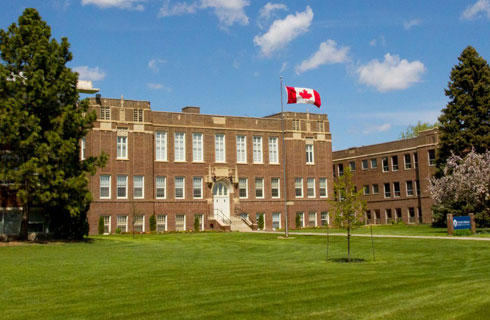国际关系/国际法硕士(MIR / MIL)
Master of International Relations and Master of International Law

学历文凭
Masters Degree (Coursework)

专业院系
NA

开学时间

课程时长

课程学费

国际学生入学条件
a bachelor's degree (or equivalent) in a discipline relevant to International Relations: peace and conflict studies, international relations, political science, sociology, cultural studies, history, economics/political economy, anthropology or ethnography, and Law, or
a Graduate Certificate in International Relations or Graduate Certificate in International Studies or Graduate Diploma in International Studies from the university, or
a bachelor's degree (or equivalent) in any discipline plus a minimum of 3 years of full-time equivalent International Relations-relevant work experience. Applications on the basis of post-secondary study and/or work experience will be individually assessed, and
a bachelor's degree (or equivalent) in a discipline relevant to International Law.
You must have a grade point average (GPA) of 5.0 on a 7-point scale in your previous qualification/s.You must have completed at least a major, field of study, or approximately 30% of program content in the discipline, including a mix of introductory and advanced courses.
IELTS overall 6.5, reading 6, writing 6, speaking 6, listening 6. For other English Language Proficiency Tests and Scores approved for UQ
TOEFL IBT - Overall 87, listening 19, reading 19, writing 21 and speaking 19.
TOEFL PBT - Overall 570, listening 54, reading 54, writing 59/5.
IDP—雅思考试联合主办方

雅思考试总分
6.5
- 雅思总分:6.5
- 托福网考总分:87
- 托福笔试总分:570
- 其他语言考试:Pearsons - Overall Score of 64 and 60 in all sub bands.
CRICOS代码: 092452K
申请截止日期: 请与IDP联系 以获取详细信息。
课程简介
Graduate with two sought-after master's qualifications and enhance your employability in the fields of international politics and law. This two year full-time (or part-time equivalent) dual master's program will enable you to understand the links between international politics and international law. These include how political events can shape international legal decision-making, the impact of law on trade, international security and other political issues, and how politics and law mutually shape each other. In International Relations, your courses introduce the history of the international system, theoretical approaches to international relations, security in the international system and international political economy. In International Law, one compulsory course introduces public international law and the remaining three focus on international law in action, and the nexus between international and domestic law. You'll then choose from a series of elective courses to suit your personal growth and interests. All of this will give you a clear understanding of the ground rules for international political behaviour, including how international law facilitates business, shapes crises and drives state behaviour, the rules that allow businesses to operate successfully in the international sphere, and the politics that sometimes override those rules. In short, you'll gain the knowledge to pursue any internationally focused career, whether in government, NGOs or international business.
相关申请
 预科
预科 奖学金
奖学金 实习机会
实习机会 在校学习
在校学习 跨境学习
跨境学习 校园授课-线上开始
校园授课-线上开始 在线/远程学习
在线/远程学习
开学时间&学费
学费信息仅供参考,请与IDP联系以获取详细信息
| 开学时间 | 时长 | 学费 | 地点 |
|---|
关于昆士兰大学

昆士兰大学(简称UQ)位于澳大利亚布里斯班,一直位于世界一流大学之列,在教学、学习和研究方面都有着无与伦比的卓越成就。昆士兰大学在全球享有盛誉,通过提供知识领导力来创造积极的变化,从而建设更美好的世界。昆士兰大学经常跻身世界一流大学行列,其中包括: 根据 2024 年世界大学科学论文绩效排名(NTU 排名),排名第 40 位。 2024 年《美国新闻》全球最佳大学排名第 41 位 2025 年 QS 世界大学排名第 40 位 2024 年世界大学学术排名第 63 位 2024 年泰晤士高等教育世界大学排名第 70 位昆士兰大学十分注重教学质量,获得的国家级教学奖项比澳大利亚任何其他大学都多。超过55000 名在校学生,包括 21500 名国际学生,在三个美丽的校区为一个多元化、包容性的社区做出了贡献。昆士兰大学以其轻松安全的生活方式、亚热带气候和充满活力的多元文化而闻名于世,学生在这里可以享受到世界上最好的校园生活。在课堂之外,大学还提供一系列令人兴奋的活动,满足学生的课外兴趣。昆士兰大学屡获殊荣的职业与就业服务为学生毕业后获得竞争优势提供支持。学生可利用每年举办的就业研讨会和社交活动,与大学广泛的校友和专业合作伙伴建立联系。昆士兰大学培养的毕业生在全球享有盛誉,他们随时准备开创成功的事业,成为各自领域的佼佼者。昆士兰大学 35.0 万名毕业生组成了一个全球校友网络,遍布 190 个国家,拥有 17700 多名博士。
本校相关课程

流行病学硕士
学历文凭
Masters Degree (Coursework)
开学日期
课程费用总额


教育学硕士-行为管理
学历文凭
Masters Degree (Coursework)
开学日期
课程费用总额


计算机科学研究生证书
学历文凭
Graduate Certificate
开学日期
课程费用总额


计算机科学硕士
学历文凭
Masters Degree (Coursework)
开学日期
课程费用总额


计算机科学研究生文凭
学历文凭
Graduate Diploma
开学日期
课程费用总额


工商管理研究生文凭
学历文凭
Graduate Diploma
开学日期
课程费用总额

其他相关课程

政治与国际关系学士/法学学士
 堪培拉大学
堪培拉大学泰晤士高等教育世界大学排名:470
学历文凭
Dual Degree
开学日期
课程费用总额


信息技术科学学士学位
 悉尼科技大学
悉尼科技大学学历文凭
Dual Degree
开学日期
课程费用总额


理学学士/法学学士
 西悉尼大学
西悉尼大学泰晤士高等教育世界大学排名:352
学历文凭
Dual Degree
开学日期
课程费用总额


商法研究生证书
 阿德莱德大学
阿德莱德大学学历文凭
Graduate Certificate
开学日期
课程费用总额


商法研究生文凭
 阿德莱德大学
阿德莱德大学学历文凭
Graduate Diploma
开学日期
课程费用总额


比较法硕士(阿德莱德/曼海姆)
 阿德莱德大学
阿德莱德大学学历文凭
Masters Degree (Coursework)
开学日期
课程费用总额










